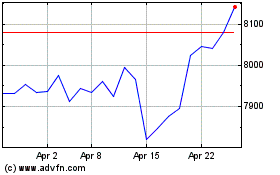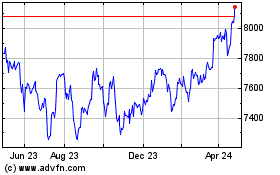BOND REPORT: Treasury Yields Decline As Mnuchin Defends Strong Dollar
February 23 2017 - 11:00AM
Dow Jones News
By Joseph Adinolfi, MarketWatch , Rachel Koning Beals
2-year bund yield pulls off of record low but likely not for
long
Treasury yields declined on Thursday after Treasury Secretary
Steven Mnuchin said the longstanding strong-dollar policy was
beneficial in the long term, and that his department was looking
into the possibility of issuing more long-term debt.
"The perception is, not that he said this explicitly, but the
perception is that he was not particularly aggressive in talking
about the strong dollar," said Guy LeBas, chief fixed-income
strategist at Janney.
Shifts in the dollar's valuation have tended to impact interest
rates, which have historically been closely correlated with the
greenback.
Mnuchin, whose interview aired on CNBC Thursday morning, also
said the administration of President Donald Trump remains committed
to "very significant" tax reform, and that it would likely be
implemented by the Congress's August recess. The Wall Street
Journal also published an interview with Mnuchin late Tuesday.
Yields edged lower on Wednesday after the Federal Reserve, in
minutes from its latest policy meeting,
(http://www.marketwatch.com/story/fed-minutes-show-support-for-rate-hike-fairly-soon-2017-02-22)
expressed confidence that the next interest-rate hike would come
"fairly soon" provided the economy stays on course or strengthens,
they said Trump's fiscal policies remained a wild card.
"The minutes of the February FOMC meeting showed the committee
was in no rush to raise rates," said Marshall Gittler, head of
investment research with FXPrimus.
Read:Why stock, bond investors shouldn't 'just buy everything'
(http://www.marketwatch.com/story/why-investors-shouldnt-just-buy-everything-2017-02-22)
Early Thursday, the yield on the benchmark 10-year Treasury note
fell 2.5 basis points to 2.388%, while the yield on the two-year
Treasury note shed 2.7 basis points to 1.192%. The yield on the
30-year bond fell 1.1 basis point to 3.024%.
Read:This is when investors should start worrying about rising
bond yields
(http://www.marketwatch.com/story/this-is-when-investors-should-start-worrying-about-rising-bond-yields-2017-02-23)
Comments Wednesday from Fed Gov. Jerome Powell, who said the
risks facing the economy are now more balanced,
(http://www.marketwatch.com/story/feds-powell-says-risks-facing-economy-are-now-more-in-balance-2017-02-22)
had initially caused yields to rise on Wednesday. He also said it
would be appropriate to tighten policy further--provided the
economy continues to improve as expected.
Last week, Fed chairwoman Janet Yellen told Congress that
waiting too long to raise interest rates would be "unwise" during
testimony that was widely characterized as hawkish. She also said
it is possible the central bank could raise rates during its coming
meetings.
Before her remarks, investor had all but scratched out the
possibility of a March hike. And still, the Fed funds futures
market is pricing in less than 20% chance of a rate hike in
March--far below the 70% threshold typically seen as the minimum
necessary to support a hike.
Typically, when investors expect rates to rise, they push yields
higher to align with the expected increase in the base rate. Also,
the dollar tends to appreciate as higher rates increase the returns
on dollar-denominated assets.
Read:Sovereign-bond yield spreads signal nervousness
(http://www.marketwatch.com/story/sovereign-bond-yield-spreads-signal-nervousness-2017-02-21)
In European trade, the yield on the German two-year note , which
traded at an all-time low at minus 0.920% Wednesday, improved
slightly to minus 0.880%. Market strategists widely attributed the
move earlier this week to a poll showing an increase in support for
far-right French presidential candidate Marine Le Pen
(http://www.marketwatch.com/story/anti-le-pen-alliance-may-give-frances-macron-a-boost-2017-02-22).
Le Pen has promised a referendum on France's European Union
membership within six months of taking office.
Analysts think the climb in yield could prove short-lived. With
political uncertainty abounding, "risk aversion has fueled further
gains in German 2-year bund prices [this week], which are
continuing to push ever higher into nose bleed territory," said
Michael Hewson, chief market analyst at CMC Markets UK. Prices and
yield move inversely.
(END) Dow Jones Newswires
February 23, 2017 10:45 ET (15:45 GMT)
Copyright (c) 2017 Dow Jones & Company, Inc.
FTSE 100
Index Chart
From Mar 2024 to Apr 2024

FTSE 100
Index Chart
From Apr 2023 to Apr 2024
